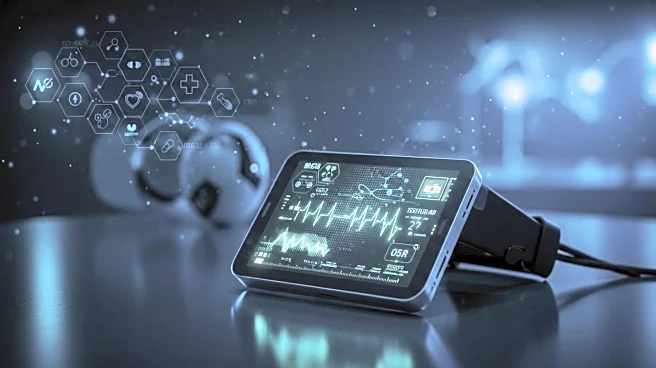What's Happening?
AI-powered gait analysis is emerging as a significant tool in healthcare, providing insights into physical, cognitive, mental, and social health through the study of walking patterns. This technology, which uses machine learning algorithms, is capable of monitoring disease progression, recovery trends, and evaluating treatment efficacy. The Mobilise-D consortium, a five-year initiative involving international research institutions, has developed digital mobility outcomes (DMOs) and biomarkers to enhance clinical care. Smartphones equipped with inertial measurement units (IMUs) are being used to collect mobility data, offering a more accessible and comprehensive method for gait analysis compared to traditional wearable sensors. This approach allows for continuous monitoring and provides a detailed picture of a patient's mobility status, which can be crucial for assessing recovery and intervention needs.
Why It's Important?
The integration of AI-powered gait analysis into healthcare has the potential to transform patient monitoring and treatment strategies. By providing detailed insights into mobility and gait, healthcare providers can better assess the efficacy of treatments and interventions, leading to improved patient outcomes. This technology can also facilitate clinical trials by simplifying patient recruitment and data collection processes, as most individuals possess smartphones. The ability to continuously monitor mobility offers a more accurate representation of a patient's health status, which is essential for personalized care. Furthermore, this advancement could lead to the development of new digital care tools, enhancing the quality of healthcare delivery and potentially reducing costs associated with traditional monitoring methods.
What's Next?
The adoption of smartphone-based gait analysis in clinical settings is expected to grow, with potential applications in monitoring chronic conditions, assessing risks of adverse events, and supporting clinical trials. Healthcare providers may begin integrating this technology into standard care practices, using it to alert caregivers about patients recovering slower than expected or to compare different treatment protocols. As the technology becomes more widespread, it could lead to the establishment of new standards for mobility assessment in clinical trials and routine care. The ongoing development of machine learning algorithms will likely enhance the accuracy and reliability of gait analysis, further solidifying its role in healthcare.
Beyond the Headlines
The use of AI-powered gait analysis raises important ethical and privacy considerations, particularly regarding the collection and use of personal health data. Ensuring that data is securely stored and used responsibly will be crucial as this technology becomes more prevalent. Additionally, the widespread adoption of smartphone-based monitoring could lead to disparities in healthcare access, as not all patients may have access to the necessary technology. Addressing these challenges will be essential to ensure equitable healthcare delivery and maximize the benefits of this innovative approach.









